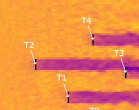Emulator#
The Emulator class orchestrates the entire Hercules simulation, managing the main execution loop and coordinating between the controller, Python simulators, and output logging.
Overview#
The emulator serves as the central coordinator that drives the simulation forward step-by-step, handling data logging, performance monitoring, and output file generation.
Simulation Flow#
For each time step:
Update external signals from interpolated data
Execute controller step (compute control actions)
Execute hybrid plant step (update component states)
Log current state to output file
Advance simulation time
Configuration Options#
Logging Configuration#
The emulator supports configurable logging frequency through the log_every_n parameter:
log_every_n(int, optional): Controls how often simulation data is logged to the output file.Default: 1 (log every simulation step)
Example:
log_every_n: 5logs data every 5 simulation stepsThis reduces output file size and improves performance for long simulations
Output File Generation#
The emulator generates HDF5 output files containing comprehensive simulation data for analysis and visualization.
The output file includes metadata with:
dt_sim: Simulation time step (seconds)dt_log: Logging time step (seconds) =dt_sim * log_every_nlog_every_n: Logging stride valuestart_clock_timeandend_clock_time: Wall clock timing information
For detailed information about the output file format and reading utilities, see the Output Files documentation.
